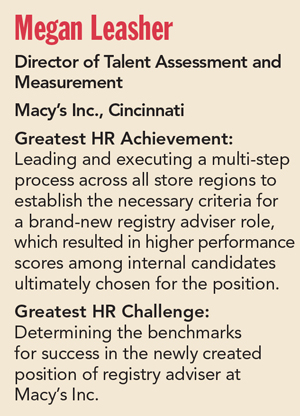This article accompanies Ever Upward.
Megan Leasher, director of talent assessment and measurement at Macy’s Inc., describes herself as a “scientist-practitioner” who uses metrics to foresee the future.
Her function within the company, she says, often requires her to apply psychological principles and cold, hard data in equal parts to develop the talent and assessment strategies, tools and processes that help the 172,500-employee organization put the right people in the right roles.
Leasher, one of HRE’s “HR’s Rising Stars” for 2016, was brought on board as manager of talent assessment and measurement in 2009, just months after the Cincinnati-based department store chain had merged seven distinct retail divisions into one. In the nearly seven years since, Leasher has helped Macy’s standardize its approach to talent and assessment – and earned a promotion to her current director role in 2013.
In the fall of 2014, for instance, Macy’s and Bloomingdale’s were preparing to restructure their respective central merchandising and marketing functions. To identify the senior leaders best suited to steer this restructuring, Leasher designed a new assessment process that relied on a combination of past performance metrics and senior leader ratings to evaluate executives and predict their future performance. As part of this process, HR facilitators led senior leaders through a series of questions designed to assess executives’ competency-based performance, and challenged them to provide examples of behavior that demonstrated their acumen and leadership abilities.
But at no point in her tenure has her hybrid approach served her better than when she was tasked with defining the ideal performer for a position that had never existed within the company.
 The wedding and gift industry has always been integral to Macy’s business. It’s also an industry that has seen drastic change in recent years, as technology and social media have forever altered the way couples (and consumers in general) shop.
The wedding and gift industry has always been integral to Macy’s business. It’s also an industry that has seen drastic change in recent years, as technology and social media have forever altered the way couples (and consumers in general) shop.
To meet these changing needs, the organization opted to eliminate the role of wedding and gift registry consultant and create the new position of registry adviser in 2014, with Leasher taking responsibility for developing the criteria for success in this newly-created function.
At the time, “stakeholders had this completely new vision for the job, but had nothing tangible to get us from A to B,” says Leasher, who holds a doctorate in industrial and organizational psychology.
To help Macy’s make that journey, Leasher partnered with assessment vendors, internal teams and senior leaders from Macy’s wedding and gift business unit to create a multi-step scientific process to evaluate would-be registry advisers.
Former wedding and gift registry consultants applying for the adviser role, for instance, were evaluated on a mix of assessments as well as behavioral-based and objective job performance.
Conducted across all of Macy’s geographic regions, the process included a series of interviews with stakeholders, wedding and gift focus groups, job observation and other job and market research to pinpoint the 15 key skills that would be needed in the new role, such as an ability to build a rapport with couples and customers, and a willingness to embrace new technologies.
Once decisions were made regarding former consultants, Macy’s evaluated external candidates using the same assessment in conjunction with a behavioral interview.
Leasher describes launching Macy’s first-ever strategic job-analysis process for the registry adviser role as her biggest challenge – and achievement – at Macy’s thus far.
“I was brought in to determine the skills and competencies needed for a job that, at the time, hadn’t existed,” says Leasher. “I functioned as a sort of mix between a psychic and scientist. We had to combine our vision for the future with our current talent strategies. Doing that meant relying on a mix of data and forethought. I think that mix was what made the process successful.”
And the process – carried out in a mere six months – has certainly been successful.
In early 2015, the HR team conducted an effectiveness study to determine the differences in year-over-year impact from eliminating the old consultant position and creating the new adviser role. Compared to former consultants who were selected for an adviser position, former consultants who were not chosen demonstrated 12 percent lower scorecard results in the last year prior to the position being eliminated. In the year following the launch of the new role, former consultants picked as advisers increased their overall scorecard tallies by another 18 percent.
Leasher’s efforts in setting the standards for the registry adviser role are an example of her knack for “using a particular need in the organization to slowly transition us to a new way of thinking,” says Michelle Krummen, vice president of talent development at Macy’s and Megan’s immediate supervisor.
Without Leasher’s leadership, “the role of the registry adviser would probably have looked different than what it is today,” says Krummen. “But it wasn’t easy. While Megan and the job-analysis process were highly regarded by the wedding team, it was hard for them to always trust the process and not fall back on legacy thinking. In the end, Megan made great strides in helping convert them to a new way of thinking.”

